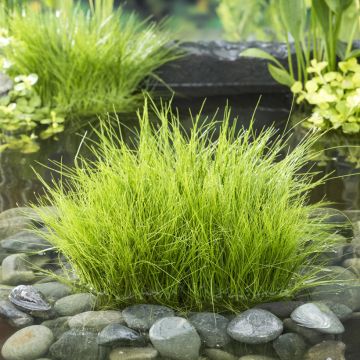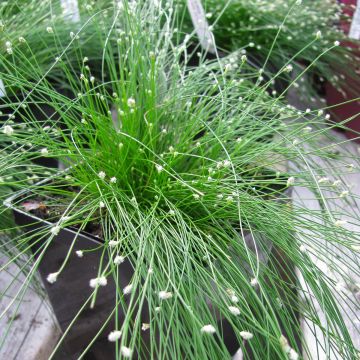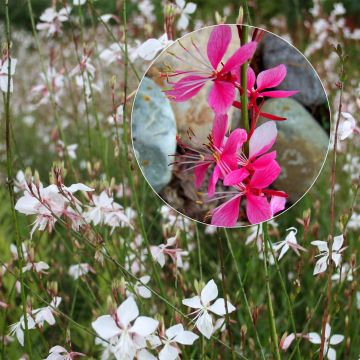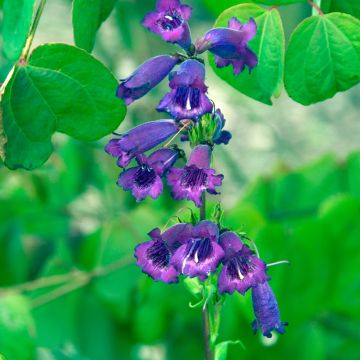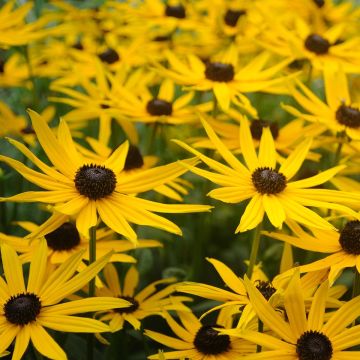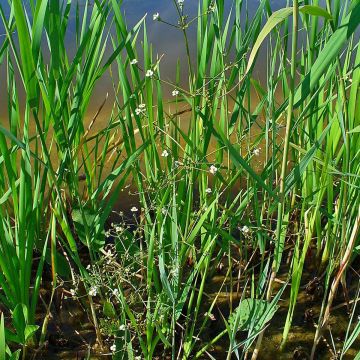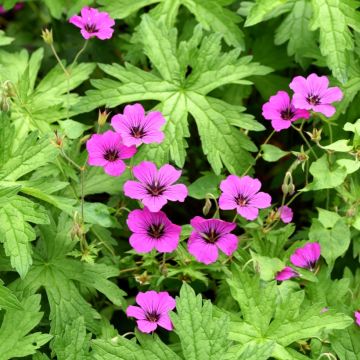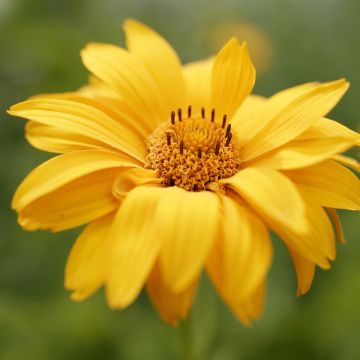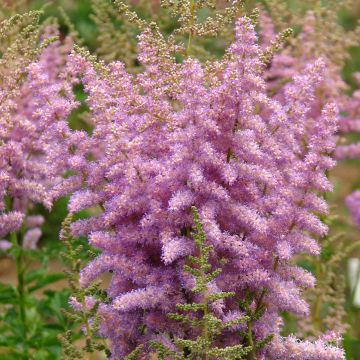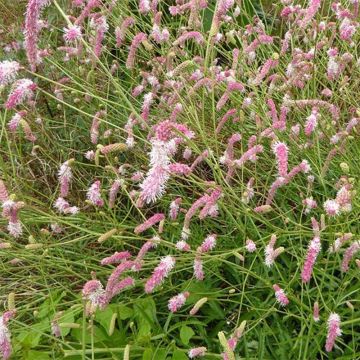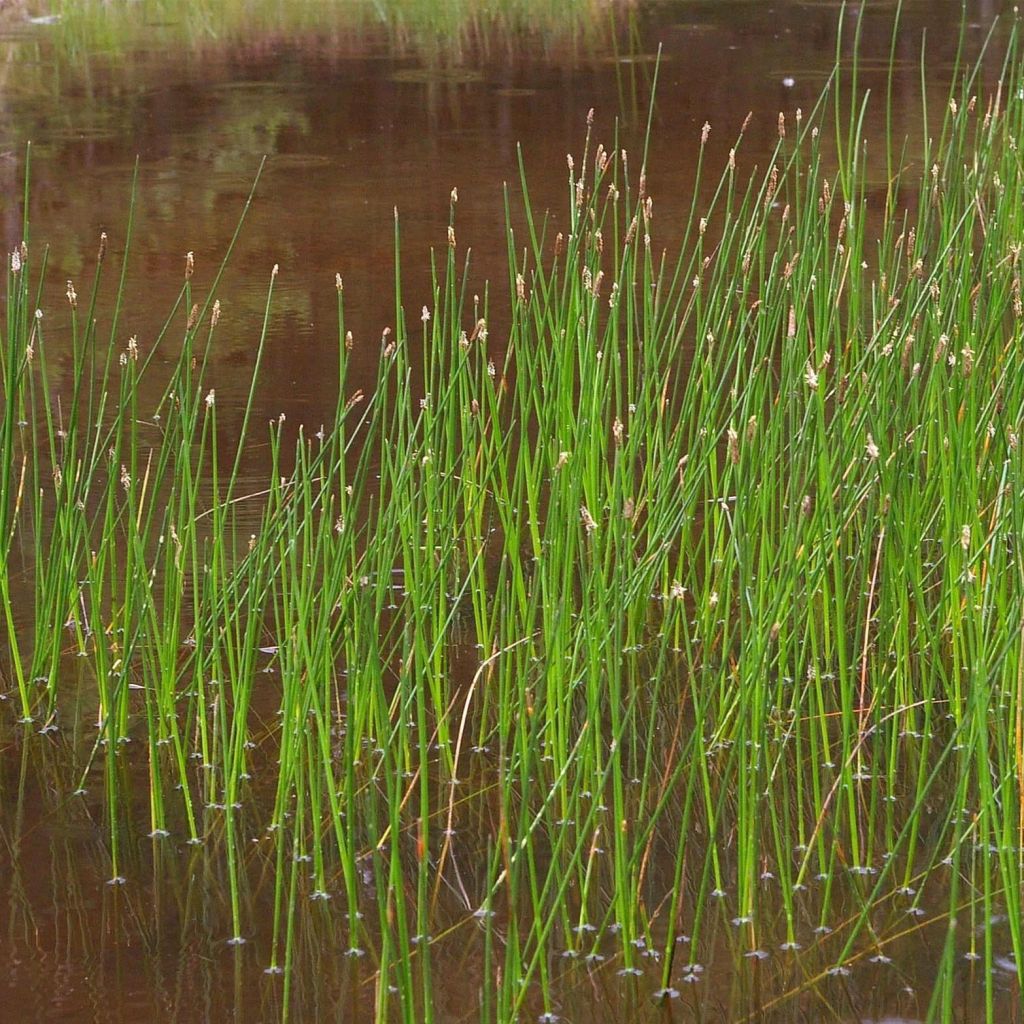

Eleocharis palustris
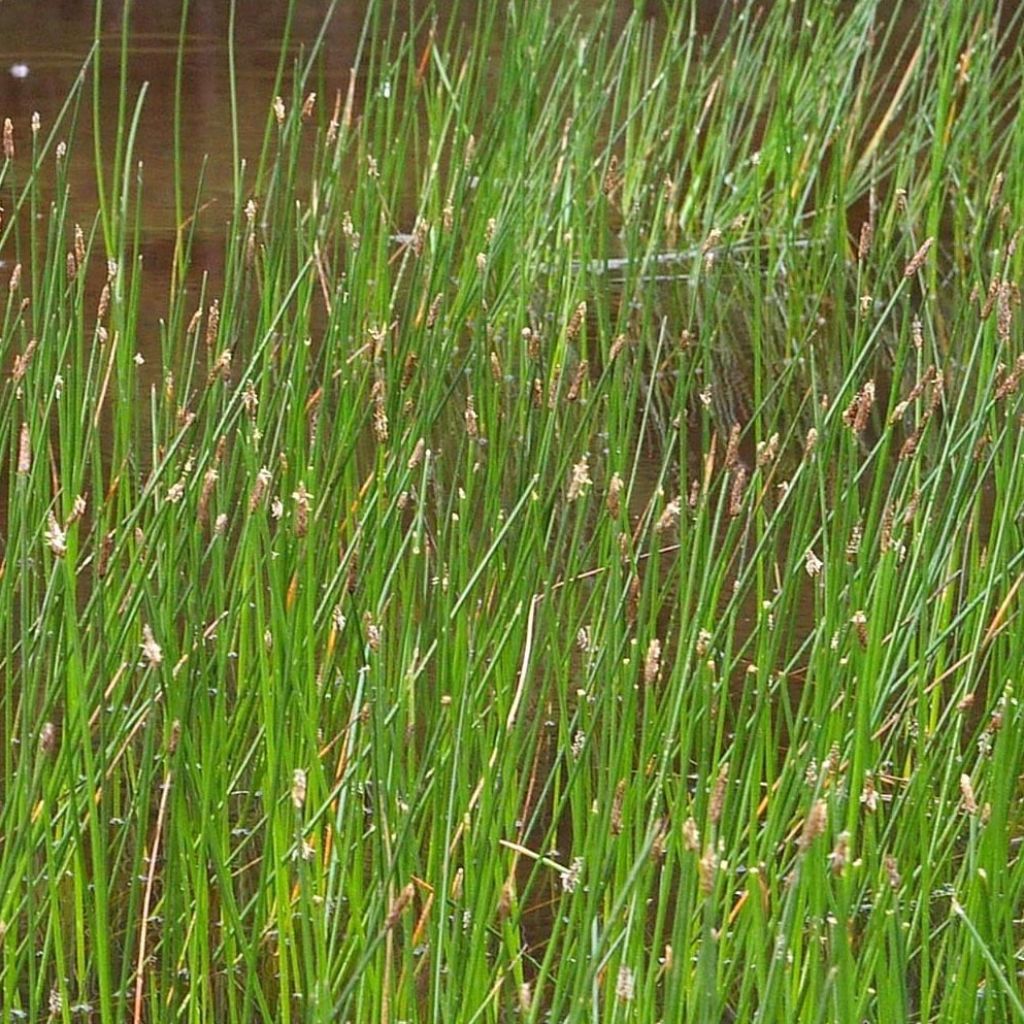

Eleocharis palustris
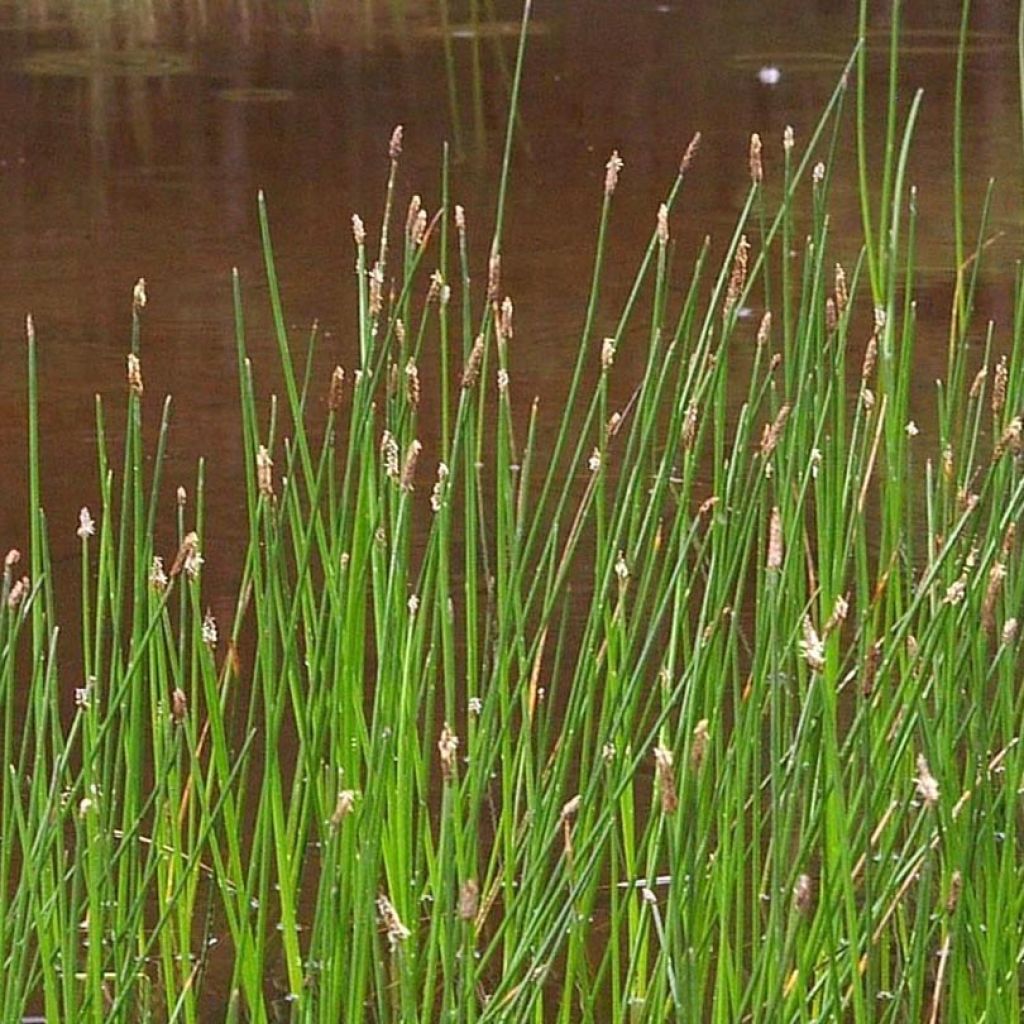

Eleocharis palustris
Eleocharis palustris
Eleocharis palustris
Common Spike-rush, Marsh Spike-rush, Creeping Spike-rush
Beautiful roots, strong.
Sandrine, 18/11/2021
Special offer!
Receive a €20 voucher for any order over €90 (excluding delivery costs, credit notes, and plastic-free options)!
1- Add your favorite plants to your cart.
2- Once you have reached €90, confirm your order (you can even choose the delivery date!).
3- As soon as your order is shipped, you will receive an email containing your voucher code, valid for 3 months (90 days).
Your voucher is unique and can only be used once, for any order with a minimum value of €20, excluding delivery costs.
Can be combined with other current offers, non-divisible and non-refundable.
Home or relay delivery (depending on size and destination)
Schedule delivery date,
and select date in basket
This plant carries a 12 months recovery warranty
More information
We guarantee the quality of our plants for a full growing cycle, and will replace at our expense any plant that fails to recover under normal climatic and planting conditions.

Would this plant suit my garden?
Set up your Plantfit profile →
Description
Eleocharis palustris, also known as Marsh Clubrush or Marsh Spike-rush, is a spreading perennial plant. A characteristic of certain wetlands or marshes, it is decorative for the delicacy and sculptural design of its upright bright green stems and its cream inflorescences that are present throughout the summer. Found at the edge of ponds or submerged in 5 to 10 cm (2 to 4in) of water, it is sometimes used as a purifying plant.
Eleocharis palustris belongs to the family of cyperaceae. It is a cosmopolitan plant, present in the entire circumboreal zone, down to the southern United States. This clubrush forms running rhizomes and has an upright habit, reaching a height of 30 to 60 cm (12 to 24in), with a minimum spread of 30 cm (12in). Its stems are cylindrical, with leaves reduced to 2 truncate brown-yellow sheaths, sometimes reddish at the base, each topped with a short spike of tiny flowers between the layered flat bracts. Flowering is between June and September. This species is difficult to distinguish by its appearance from other species of the same genus. But it differs from bulrush by its isolated stems on long stolons not clustered in a clump.
Eleocharis is very hardy, suitable for pond edges, marshy areas, or even a large container. Allow a significant space due to its somewhat invasive character. Plant it at a depth of 20 centimetres (8 inches), the rhizomes can be submerged under 10 cm (4in) of water. The average planting distance between plants is 30 centimetres (12 inches), in groups of 5 to 10 for a better effect. Marsh Clubrush grows in moist to wet soil and prefers a sunny exposure. The plant can tolerate temperatures down to -45°C (1°F). It may be necessary to remove the flowers to prevent self-seeding.
Marsh Spike-rush is ideal as a ground cover for flooded areas, and it is also very useful for pond purification. It can also be grown in pots.
Report an error about the product description
Eleocharis palustris in pictures
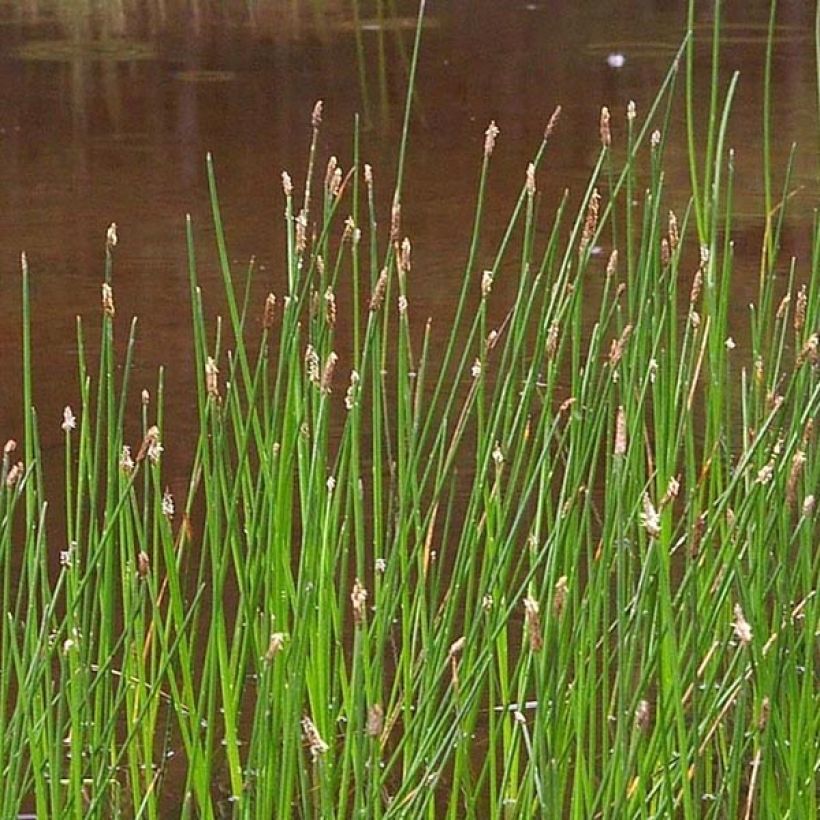

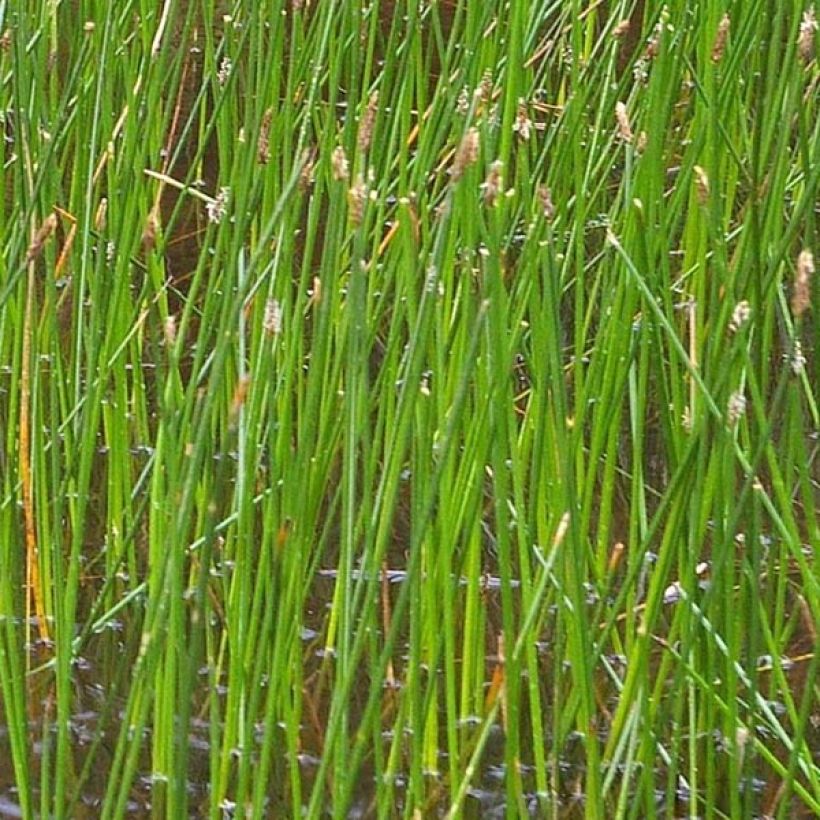

Flowering
Foliage
Plant habit
Botanical data
Eleocharis
palustris
Cyperaceae
Common Spike-rush, Marsh Spike-rush, Creeping Spike-rush
Northern Europe
Other Scirpus
View all →Planting and care
Plant Marsh Sedge in very moist, rich soil, even clay or loamy clay, limestone to neutral, in a sunny location. In nature, these plants grow at the edge of wet ditches and naturally stagnant, shallow waters. Marsh Sedge should be planted at a depth of 20 cm (8in), with its crown able to be submerged up to 10 cm (4in). The average planting distance between plants is 30 centimetres (12 inches), in groups of 5 to 10 for a better effect.
Planting period
Intended location
Care
-
, onOrder confirmed
Reply from on Promesse de fleurs
Similar products
Haven't found what you were looking for?
Hardiness is the lowest winter temperature a plant can endure without suffering serious damage or even dying. However, hardiness is affected by location (a sheltered area, such as a patio), protection (winter cover) and soil type (hardiness is improved by well-drained soil).

Photo Sharing Terms & Conditions
In order to encourage gardeners to interact and share their experiences, Promesse de fleurs offers various media enabling content to be uploaded onto its Site - in particular via the ‘Photo sharing’ module.
The User agrees to refrain from:
- Posting any content that is illegal, prejudicial, insulting, racist, inciteful to hatred, revisionist, contrary to public decency, that infringes on privacy or on the privacy rights of third parties, in particular the publicity rights of persons and goods, intellectual property rights, or the right to privacy.
- Submitting content on behalf of a third party;
- Impersonate the identity of a third party and/or publish any personal information about a third party;
In general, the User undertakes to refrain from any unethical behaviour.
All Content (in particular text, comments, files, images, photos, videos, creative works, etc.), which may be subject to property or intellectual property rights, image or other private rights, shall remain the property of the User, subject to the limited rights granted by the terms of the licence granted by Promesse de fleurs as stated below. Users are at liberty to publish or not to publish such Content on the Site, notably via the ‘Photo Sharing’ facility, and accept that this Content shall be made public and freely accessible, notably on the Internet.
Users further acknowledge, undertake to have ,and guarantee that they hold all necessary rights and permissions to publish such material on the Site, in particular with regard to the legislation in force pertaining to any privacy, property, intellectual property, image, or contractual rights, or rights of any other nature. By publishing such Content on the Site, Users acknowledge accepting full liability as publishers of the Content within the meaning of the law, and grant Promesse de fleurs, free of charge, an inclusive, worldwide licence for the said Content for the entire duration of its publication, including all reproduction, representation, up/downloading, displaying, performing, transmission, and storage rights.
Users also grant permission for their name to be linked to the Content and accept that this link may not always be made available.
By engaging in posting material, Users consent to their Content becoming automatically accessible on the Internet, in particular on other sites and/or blogs and/or web pages of the Promesse de fleurs site, including in particular social pages and the Promesse de fleurs catalogue.
Users may secure the removal of entrusted content free of charge by issuing a simple request via our contact form.
The flowering period indicated on our website applies to countries and regions located in USDA zone 8 (France, the United Kingdom, Ireland, the Netherlands, etc.)
It will vary according to where you live:
- In zones 9 to 10 (Italy, Spain, Greece, etc.), flowering will occur about 2 to 4 weeks earlier.
- In zones 6 to 7 (Germany, Poland, Slovenia, and lower mountainous regions), flowering will be delayed by 2 to 3 weeks.
- In zone 5 (Central Europe, Scandinavia), blooming will be delayed by 3 to 5 weeks.
In temperate climates, pruning of spring-flowering shrubs (forsythia, spireas, etc.) should be done just after flowering.
Pruning of summer-flowering shrubs (Indian Lilac, Perovskia, etc.) can be done in winter or spring.
In cold regions as well as with frost-sensitive plants, avoid pruning too early when severe frosts may still occur.
The planting period indicated on our website applies to countries and regions located in USDA zone 8 (France, United Kingdom, Ireland, Netherlands).
It will vary according to where you live:
- In Mediterranean zones (Marseille, Madrid, Milan, etc.), autumn and winter are the best planting periods.
- In continental zones (Strasbourg, Munich, Vienna, etc.), delay planting by 2 to 3 weeks in spring and bring it forward by 2 to 4 weeks in autumn.
- In mountainous regions (the Alps, Pyrenees, Carpathians, etc.), it is best to plant in late spring (May-June) or late summer (August-September).
The harvesting period indicated on our website applies to countries and regions in USDA zone 8 (France, England, Ireland, the Netherlands).
In colder areas (Scandinavia, Poland, Austria...) fruit and vegetable harvests are likely to be delayed by 3-4 weeks.
In warmer areas (Italy, Spain, Greece, etc.), harvesting will probably take place earlier, depending on weather conditions.
The sowing periods indicated on our website apply to countries and regions within USDA Zone 8 (France, UK, Ireland, Netherlands).
In colder areas (Scandinavia, Poland, Austria...), delay any outdoor sowing by 3-4 weeks, or sow under glass.
In warmer climes (Italy, Spain, Greece, etc.), bring outdoor sowing forward by a few weeks.






























